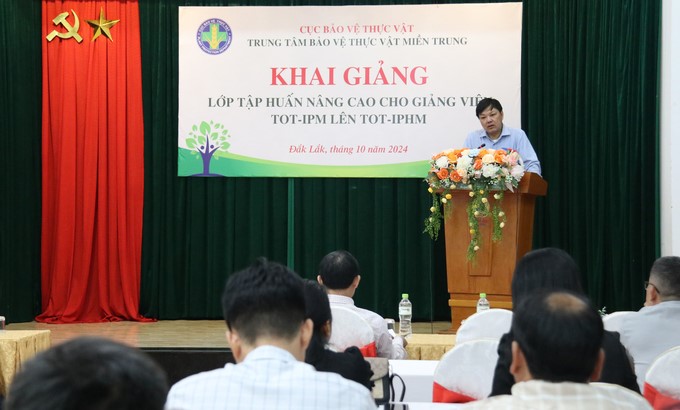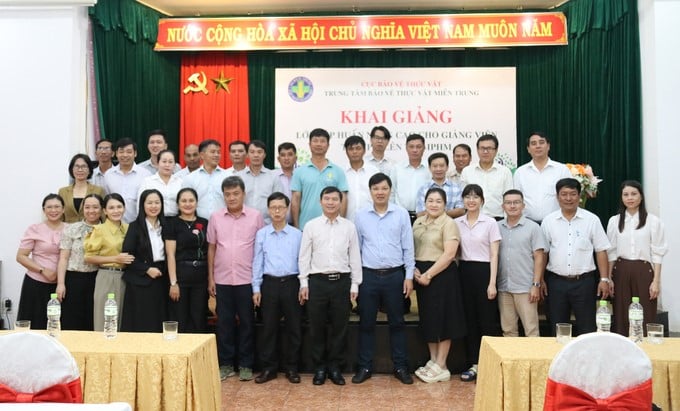November 26, 2025 | 09:36 GMT +7
November 26, 2025 | 09:36 GMT +7
Hotline: 0913.378.918
November 26, 2025 | 09:36 GMT +7
Hotline: 0913.378.918
According to the Central Regional Plant Protection Center, since 2022, the Ministry of Agriculture and Rural Development has issued a Decision approving the "Action plan to promote the application of integrated plant health management (IPHM) on key crops in Vietnam in the 2022–2030 period.".
On that basis, the Plant Protection Department has issued a decision approving the outline for implementing the task "Developing applications for integrated pest management (IPM/IPHM) and biological measures to prevent harmful organisms on plants” in 2024.

Mr. Luong Anh Tuan, Director of the Central Regional Plant Protection Center, spoke at the opening of the training class. Photo: Quang Yen.
The Central Regional Plant Protection Center was assigned by the Plant Protection Department to organize an advanced training class for TOT-IPM teachers on TOT-IPHM in Dak Lak.
Participating in the training class, TOT-IPM teachers will be supplemented with knowledge about integrated plant health management so that these teachers have enough knowledge and conditions to teach TOT-IPHM classes. Thereby creating a source of IPHM teachers for the provinces to train and organize TOT-IPHM classes at the provincial level and train local farmers (FFS) on integrated plant health management (IPHM).
According to the Central Regional Plant Protection Center, current coverage of the IPHM program is limited due to a lack of investment funding. The number of IPHM teachers trained in recent years across the country has increased significantly. However, there is a difference in the number of teachers in each locality.
Therefore, the class, with the participation of 30 students and the companionship of five national TOT-IPHM teachers, will contribute to promoting the IPHM program in localities.
Mr. Luong Anh Tuan, Director of the Central Regional Plant Protection Center, said that since 2020, world scientific forums with the participation of many international organizations have met to discuss the "One Health" topic.
According to Mr. Tuan, this is an integrated approach to the basic relationships between human health, animal and plant health, and environmental health. During the process of discussion, opinions from many developed countries assumed that it was necessary to pay attention to plant health.

The training class, with the participation of 30 students and the companionship of five national TOT-IPHM teachers, will contribute to promoting the IPHM program in localities. Photo: Quang Yen.
"Plants are a source of products for humans and are used as feed for livestock production, as well as having many other values and benefits. If the plants are not healthy and the products are not safe, they will affect human health.
On that basis, the Plant Protection Department has proposed that the Ministry of Agriculture and Rural Development develop a program and action plan to implement the integrated plant health management (abbreviated as IPHM) program on the basis of inheriting the integrated pest management (IPM) program in Vietnam. In 2024, the Center was assigned by the Plant Protection Department to organize IPHM teacher training classes and farmer training classes (FFS) on durian trees in some Central Highlands provinces," Mr. Tuan said.
Mr. Tuan hopes that students will acquire professional knowledge and skills when studying and experiencing at the training class, as well as combining group working skills; field classroom (FFS) instruction skills; communication and dissemination skills; non-formal training methods for older people; and propagating and disseminating knowledge.
“Currently, plant health management is regulated as a criteria in the new rural assessment. With this regulation, developing TOT-IPHM teachers in the coming time is very necessary. At the end of the class, TOT-IPHM teachers will be qualified to be teachers in provincial training classes, coaching, guiding the community, or training farmers on IPHM," Mr. Tuan added.
Translated by Thu Huyen
/2025/11/24/3536-2-112800_176.jpg)
(VAN) Dong Nai now has tens of thousands of hectares of forests certified for sustainable management, and this area will continue to be expanded in the coming period.

(VAN) Vinh Ha hamlet (Dai Xuyen commune, Hanoi) is shifting away from small-scale farming as households adopt bioscurity into their breeder chicken models.

(VAN) Heavy rains make aquatic species more vulnerable to disease. Proactive water management and high-tech systems help farmers prevent outbreaks and protect yields.

(VAN) Greenhouses are shifting production mindsets in Binh Lu commune, enabling farmers to ‘weather the sun and rain’ and secure stable vegetable harvests throughout the year.

(VAN) Green transition is crucial for the Mekong Delta amid climate change and stricter standards, offering a path toward sustainability.

(VAN) Dong Thap promotes agricultural restructuring, forms large specialized farming zones, raises the value of agricultural products and develops toward ecological and high-tech directions.
/2025/11/22/4018-4-213342_747.jpg)
(VAN) The Mekong Delta Agricultural Experts Club has attracted 143 experts and researchers to participate in providing consultancy and contributing initiatives to the development of one million hectares of high-quality rice.